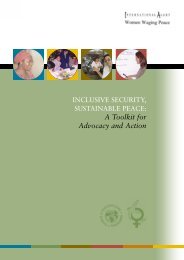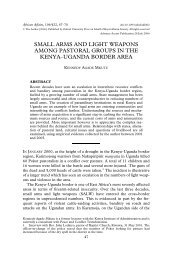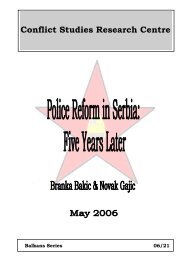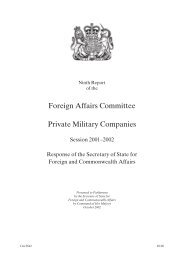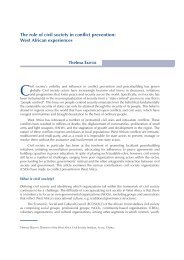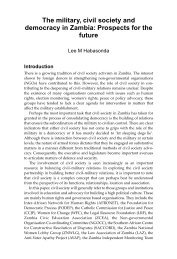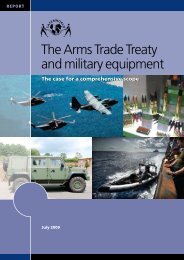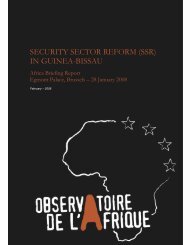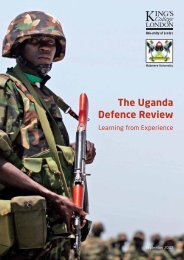promoting security sector reform in fragile states - GFN-SSR
promoting security sector reform in fragile states - GFN-SSR
promoting security sector reform in fragile states - GFN-SSR
Create successful ePaper yourself
Turn your PDF publications into a flip-book with our unique Google optimized e-Paper software.
3. Do unaccountable <strong>security</strong> forces create<br />
a sense of <strong>in</strong><strong>security</strong> with<strong>in</strong> the country as<br />
a whole or among certa<strong>in</strong> communities<br />
and groups? If so, consider<br />
• support<strong>in</strong>g the creation of police<br />
councils and other civilian bodies to<br />
monitor the behavior of the <strong>security</strong><br />
bodies<br />
• encourag<strong>in</strong>g dialogue between civilians<br />
and <strong>security</strong> body personnel <strong>in</strong><br />
a politically safe space if conditions<br />
permit, i.e. when reprisals aga<strong>in</strong>st<br />
civilian participants seem unlikely<br />
• identify<strong>in</strong>g the underly<strong>in</strong>g causes of<br />
unaccountability and devis<strong>in</strong>g a strategy<br />
to address these causes<br />
4. Does civil society lack substantive<br />
knowledge of <strong>security</strong>-related issues? If so,<br />
conside:<br />
• support<strong>in</strong>g efforts to develop <strong>in</strong>digenous<br />
tra<strong>in</strong><strong>in</strong>g capacity for civil society<br />
• provid<strong>in</strong>g scholarships <strong>in</strong> <strong>security</strong><br />
studies, defense management, law,<br />
and other relevant subjects<br />
Security Context<br />
1. Is transborder crime a major problem?<br />
If so, consider<br />
• support<strong>in</strong>g the development of regional<br />
polic<strong>in</strong>g capacity<br />
• encourag<strong>in</strong>g regional dialogues on<br />
<strong>security</strong> issues<br />
2. Is the country at war? If so, consider<br />
• encourag<strong>in</strong>g parties to the conflict to<br />
discuss <strong>security</strong> <strong>sector</strong> governance <strong>in</strong><br />
the course of peace negotiations<br />
• support<strong>in</strong>g postconflict demilitarization<br />
efforts, such as demobilization<br />
and re<strong>in</strong>tegration of ex-combatants<br />
and the disarmament of ex-combatants,<br />
irregular forces, and the population<br />
at large<br />
• tra<strong>in</strong><strong>in</strong>g civilians to enhance their<br />
capacity to manage and oversee the<br />
<strong>security</strong> <strong>sector</strong><br />
3. Do regional tensions create arms races<br />
and provide a justification for greater<br />
resource allocation to the <strong>security</strong> <strong>sector</strong>? If<br />
so, consider<br />
• encourag<strong>in</strong>g regional dialogues on<br />
<strong>security</strong> issues<br />
4. Although the country is not at war, is<br />
there a tendency to resolve disputes domestically<br />
and with other countries through<br />
the use of force? If so, consider<br />
• reduc<strong>in</strong>g access to weapons by all<br />
parties, for example through arms-sale<br />
moratoria<br />
• strengthen<strong>in</strong>g democratic accountability<br />
of civil authorities to the<br />
general population<br />
• support<strong>in</strong>g the development of a<br />
capacity to defuse conflicts, thereby<br />
reduc<strong>in</strong>g the likelihood of a resort to<br />
violence<br />
5. Do neighbor<strong>in</strong>g countries seek to destabilize<br />
the government, for example, by<br />
arm<strong>in</strong>g dissidents? If so, consider<br />
• encourag<strong>in</strong>g the development or<br />
strengthen<strong>in</strong>g of regional <strong>security</strong><br />
mechanisms<br />
• encourag<strong>in</strong>g regional dialogues on<br />
<strong>security</strong> issues<br />
• work<strong>in</strong>g to reduce access to arms<br />
6. Are fundamental <strong>in</strong>stitutions such as<br />
the crim<strong>in</strong>al justice system poorly developed<br />
or not function<strong>in</strong>g adequately? If so,<br />
consider<br />
• assist<strong>in</strong>g <strong>in</strong> development and implementation<br />
of crim<strong>in</strong>al justice policy<br />
• support<strong>in</strong>g democratic polic<strong>in</strong>g, judicial<br />
strengthen<strong>in</strong>g, and legal tra<strong>in</strong><strong>in</strong>g<br />
• support<strong>in</strong>g efforts to demilitarize police,<br />
for example, by separat<strong>in</strong>g them<br />
from the armed forces and <strong>promot<strong>in</strong>g</strong><br />
democratic polic<strong>in</strong>g<br />
• support<strong>in</strong>g efforts to depoliticize the<br />
judiciary<br />
• support<strong>in</strong>g civil society’s ability to<br />
monitor the activities of the crim<strong>in</strong>al<br />
justice system and provide tra<strong>in</strong><strong>in</strong>g<br />
for members of the crim<strong>in</strong>al justice<br />
system<br />
• support<strong>in</strong>g the development of<br />
regional polic<strong>in</strong>g capacity to address<br />
crossborder problems and strengthen<br />
commitment to democratic pr<strong>in</strong>ciples<br />
and practices<br />
PROMOTING SECURITY SECTOR REFORM IN FRAGILE STATES 31






